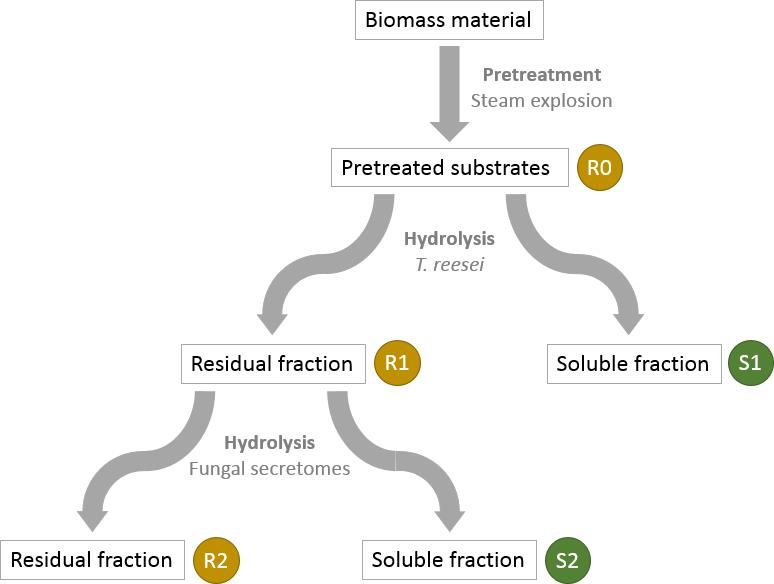Lignocellulosic biomass is an interesting raw material for the production of fuels and chemical intermediates because it is abundant and has a much smaller environmental footprint than fossil alternatives. On the other hand, its considerable structural and chemical complexity represents an obstacle to the development of viable conversion processes. The biochemical decomposition of sugar polymers thus requires a physicochemical pre-treatment to break down the structure of this complex substrate and thereby making it accessible to polysaccharide degrading enzymes (produced by the filamentous fungus Trichoderma reesei). However, their conversion via hydrolysis remains incomplete since parts of these polymers remain inaccessible.
The F’Unlock project (IFPEN, CNRS, INRA) sought to gain a better understanding of the reasons for this recalcitrance while seeking new, more effective enzymes to overcome it. The structural and physicochemical analysis of hydrolyzed samples, containing varying quantities of recalcitrant fractions, made it possible to find relevant biodegradability markersa, in view of guiding enzyme selection. Moreover, new enzymes, from fungal biodiversity, were tested on partially hydrolyzed and more recalcitrant fractions R1 (figure) via a second enzymatic hydrolysis stepb.

In addition to its use for enzyme selection, marker identification has enabled a better understanding of the cause of biomass recalcitrance, paving the way
for subsequent research(1). Moreover, since none of the enzyme mixtures tested were more efficient than the reference mixture, it appears that significant enzyme diversity is not essential. A more complete conversion of biomass may thus depend on some key catalytic activities, combined with effective pre-treatment.
a - Particularly lignin content, cellulose crystallinity, water adsorption capacity.
b - Giving rise to residual fractions R2 (figure).
(1) G. Paës, D. Navarro, Y. Benoit, S. Blanquet, B. Chabbert, B. Chaussepied, P. M. Coutinho, S. Durand, I. V. Grigoriev, M. Haon, L. Heux C. Launay, A. Margeot, Y. Nishiyama, S. Raouche, M. N. Rosso, E. Bonnin, J. G. Berrin. Biotechnol Biofuels. 2019 Apr 1; 12:76.
DOI : 10.1186/s13068-019-1417-8
Scientific contacts: senta.blanquet@ifpen.fr and antoine.margeot@ifpen.fr





